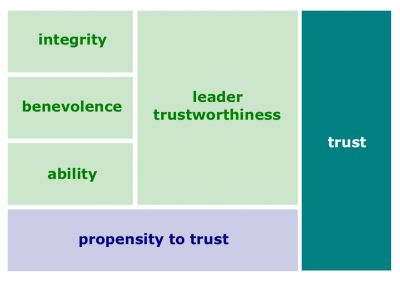Difference between revisions of "Trust"
MariamKhalid (talk | contribs) |
|||
| Line 6: | Line 6: | ||
According to [[Management by Robbins and Coulter (14th edition)]], | According to [[Management by Robbins and Coulter (14th edition)]], | ||
:[[Trust]]. The belief in the integrity, character, and ability of a [[leader]]. | :[[Trust]]. The belief in the integrity, character, and ability of a [[leader]]. | ||
| − | + | According to the [[Marketing Communications by Fill (5th edition)]], | |
| + | :[[Trust]]. The confidence a person has in another, an object, brand or organization that they will behave appropriately or as promised. | ||
| Line 16: | Line 17: | ||
*[[Leadership Quarter]]. | *[[Leadership Quarter]]. | ||
| − | [[Category:Management]][[Category: Septem Artes Administrativi]][[Category: Articles]] | + | [[Category:Management]][[Category: Septem Artes Administrativi]][[Category: Articles]][[Category: Marketing Management]] |
Latest revision as of 15:08, 15 July 2020
Trust is a positive expectation that another will not act opportunistically. For a leader, trust is the belief in the integrity, character, and ability to lead.
Definitions
According to Organizational Behavior by Robbins and Judge (17th edition),
- Trust. A positive expectation that another will not act opportunistically.
According to Management by Robbins and Coulter (14th edition),
According to the Marketing Communications by Fill (5th edition),
- Trust. The confidence a person has in another, an object, brand or organization that they will behave appropriately or as promised.
Key concepts
- Trust propensity. How likely an employee is to trust a leader.
- Identification-based trust. Trust based on a mutual understanding of each other's intentions and appreciation of each other's wants and desires.
